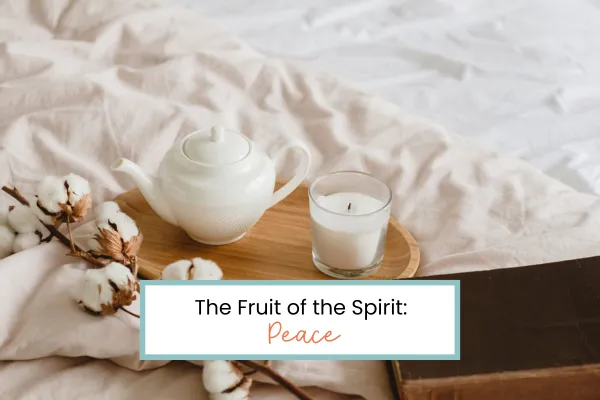

The Fruit of the Spirit: Peace
"Peace I leave with you, my peace I give unto you: not as the world giveth, give I unto you. Let not your heart be troubled, neither let it be afraid." — John 14:27
Have you ever tried your best to keep the peace with someone who clearly was trying to cause you harm? It could be a gossiper, an abusive spouse (emotionally and/or physically), or a person who pretends to be your friend, but then turns around and stabs you in the back.
What we’re really searching for is calm. No arguments. We want everyone to get along. No conflict. So we do what we feel like we have to do in order to have this perceived serenity.
Don’t get me wrong. I hate conflict. I’ve done my fair share of trying to keep the peace. I hate it when people are arguing. However, I have learned that appeasing people is not the same as having peace.
Because we think if we can keep the peace with these individuals (do whatever they want us to do, try and help them to see that their actions are destructive, etc), then there will finally be some peace.
I hate to tell you this, but nothing could be further from the truth. Actually, the book of Proverbs instructs us to stay away from these kinds of people. Each situation is different and how we stay away is also directed by the Holy Spirit.
Is this the kind of peace the Bible is talking about when it describes this particular fruit? In a back-door kind of way, it is. But the first thing that needs to happen is for the Lord to grow this fruit in our hearts, regardless of what may be happening around us.
You can’t have peace with other people (which sometimes requires the hard choices of not pandering to the bullies) if you’re not allowing the Holy Spirit to grow this fruit in your heart first.
When Paul writes about the fruit of the Spirit in Galatians 5:22-23, he is referring to the qualities and virtues that should naturally come from a life influenced by the Holy Spirit.
It embodies a sense of wholeness, tranquility, and inner harmony that can only be found through a deep and abiding relationship with God.

What Does Peace Mean?
We know that in this context, peace isn’t just absence of conflict.
What is it then?
Personal Peace: This is the internal calm and assurance one experiences, regardless of external circumstances. It is a tranquility that comes from trusting in God's promises and sovereignty.
Relational Peace: This aspect of peace concerns harmonious relationships with others. It involves forgiveness, reconciliation, and living in harmony with those around us. (Like I mentioned earlier, this does not mean that we allow ourselves to be subjected to abuse and other destructive relationships. It doesn’t mean letting just anyone into our lives, no matter how evil their intentions are.) You cannot have harmony with people who are determined to gossip and manipulate.
Spiritual Peace: Spiritual peace is the ultimate peace that comes from being reconciled with God. It is the assurance of salvation and the confidence that one’s life is in God’s hands.
Examples of Peace in Everyday Life
1. Peace in Personal Trials
Imagine a person facing a significant personal challenge, such as a health crisis or financial difficulty. The peace of the Spirit manifests as an inner calm and trust in God's provision and timing, even when the situation appears dire.
This peace is not based on the absence of problems, but on the presence of God. It allows the individual to face their trials with courage and hope, knowing that they are not alone and that God's plan is ultimately for their good.
For example imagine a devoted Christian is diagnosed with a serious illness. Instead of succumbing to fear and anxiety, she chooses to focus on her faith. She spends time in prayer, seeking God's peace.
Despite her circumstances, she finds a deep sense of calm and assurance that sustaines her throughout her treatment. Her peace is a testimony to those around her, showing the power of faith in overcoming life's challenges.

2. Peace in Relationships
Interpersonal conflicts are inevitable, but the fruit of peace enables individuals to handle disputes with grace and understanding. This peace encourages forgiveness, patience, and a willingness to listen and reconcile.
We all have our own viewpoints and this can cause a bit of conflict. But true peace fosters an environment where conflicts can be resolved amicably, and relationships can be strengthened rather than broken.
Imagine if you had a heated argument over a misunderstanding. Instead of allowing anger to fester, it’s important to take a step back and pray for peace. Guided by the Spirit, you can approach the other individual with humility and a desire to reconcile.
You can openly discuss your feelings, forgive each other, and restore your relationship. This is how peace can help transform potentially destructive conflicts into opportunities for growth and deeper connection.
Cultivating Peace in Our Lives

To cultivate the fruit of peace, it’s essential to maintain a close relationship with God through prayer, meditation on Scripture, and a conscious effort to obey the Spirit. Here are some practical steps:
Daily Prayer and Reflection: Begin and end each day with prayer, asking God to fill you with His peace. Reflect on His promises and let them reassure you in times of trouble.
Scripture Study: Regularly read and meditate on Bible passages that speak about peace. Verses like Philippians 4:6-7 and John 14:27 can be particularly encouraging.
Practice Forgiveness: Actively seek to forgive those who have wronged you and ask for forgiveness from those you have wronged. Forgiveness is a powerful pathway to peace.
Promote Unity: In your community, strive to be a peacemaker. Engage in activities and conversations that promote understanding and unity.
Trust in God's Plan: In moments of anxiety or uncertainty, remind yourself of God's sovereignty and His plans for your welfare, as stated in Jeremiah 29:11.

